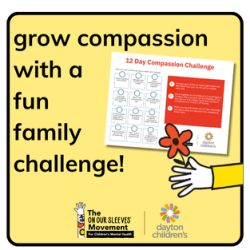grow compassionate children with these 3 simple tips
click here to take the Compassion Challenge as a family for fun and connecting activities!

We’ve all heard how showing kindness can boost our own wellbeing (check out our previous blogs on the topic). Doing kind things for others takes our mind off our own challenges and struggles and helps us to feel more positive. But being compassionate takes it a step further and gives us a sense of belonging.
To understand that let’s first talk about what compassion is.
- Compassion is a key component to building and keeping relationships.
- Compassion is showing that you care about someone and helping them.
- Compassion is the ability to show you care about someone else.
“While kindness is doing nice things for others, compassion adds empathy (putting yourself in someone else’s shoes),” says Emily Weitz, children’s mental health expert.
And experts also say that kids who are compassionate are:
- Able to show they care about other people
- Capable of having better interactions with others they cross paths with
- Easily able to express appreciation for what they have.
So, how can we help kids take their kindness a step further? Like kindness, compassion is contagious—one small act can inspire many more. To nurture compassion in children, focus on these three key components: take action, have meaningful conversations, and navigate challenges.
1. take action
The most impactful way to teach compassion is to model it yourself. Children will follow how you act. So, if you treat others, including strangers, with compassion then your kids will learn to do the same. Here are a few simple but impactful ways to take action and set a great example:
- Give back: Create opportunities for your kids to give back to others. Maybe you can have them donate toys to a toy drive or help a neighbor with yard work or shovel snow for free.
- Practice compassion: Make compassion part of your everyday routine by doing things like:
- Creating a family culture of saying “please” and “thank you”
- Asking your children “Who did you help today?” or “Who helped you today?”
- Making an effort to regularly donate to food bank barrels
- Take the challenge: Want to jump-start your compassion practice? Try On Our Sleeves’ 12-day Compassion Challenge to inspire daily acts of kindness. It’s a fun and easy way to integrate these habits into your life. Download the free challenge here and start today!
2. have conversations
- Set the scene: Create a scenario—either imagined or based on real life—and talk it through with your child. Ask them how they might feel in each situation and how others involved might feel too. This simple exercise helps children practice stepping into someone else’s shoes and how they might be feeling.
This fun cartoon video brings author and podcaster, Brené Brown’s, insights on empathy to life. As an expert on mental wellness, Brené helps us understand how empathy can make a big difference in our lives. Watch it with your kids and take a moment to talk about it together as a family!
- Point out compassion in action: When you see compassion in action take the opportunity to point it out so kids can learn the value of compassion and how it affects others. When you see examples of compassion in your community or on TV, point them out and discuss what made those actions compassionate. Share inspiring stories about people known for their good deeds to make compassion relatable and inspiring for your child. And of course, if you see your child practicing compassion, take the opportunity to praise them!
- Set up story time: Reading story books about kindness and compassion can be a way to spark conversations about compassion. As you read, encourage your child to think about how the characters feel and act. Ask questions like, “What did the characters do to help?” or “How do you think [that action] made the character feel?” These conversations allow kids to explore emotions and actions in a meaningful way.
3. navigate challenges
Like anything else in life, teaching our children the life skill of compassion can come with some obstacles. Below are some common ones and how you can overcome them.
- If you feel resistance: Do you ever feel like sometimes when you tell your child to do something, they do the opposite? For example, if you tell them to show compassion for a sibling you may get a bad response. If this happens, stay patient. Continue to reinforce the message of compassion and that being compassionate sometimes means showing that you care about others even when they don’t show it back.
- If they don’t know how to start: Sometimes, kids want to be compassionate but don’t know how to take that first step. To help, keep the conversation going. Talk through examples of when and how to show compassion (like comforting a friend who has lost a loved one, helping someone who’s hurt, or including a classmate who’s left out at recess). These discussions can give your child ideas and strategies for tricky situations.
- If they’re afraid of making mistakes: If your child seems hesitant to try because they don’t want to fail or make a mistake, it’s great to remind them that we are all growing and learning. You can share a time in your own life when you did not make a kind choice. Take time to be there for your child if they do make a mistake or find it difficult and continue to help guide them to make better decisions in the future.
Growing compassionate children is an ongoing process. By remembering to take action, have conversations and navigate challenges we can help encourage compassion within them. It’s important that we all remember to continue to model, have conversations, and give opportunities for our children to show compassion naturally.
Ready to help your kids build compassion in a fun and meaningful way? Try the On Our Sleeves 12-Day Compassion Challenge! This free downloadable guide is packed with 12 simple activities that will inspire kindness, empathy, and connection.

Turn it into a family challenge or enjoy the activities together—either way, it’s a great way to inspire your kids, strengthen family bonds, and make a positive impact. Click here to download your free guide today and start spreading compassion, one day at a time!
join the movement
Kids don’t wear their thoughts on their sleeves. Help us break the stigma and gives kids a voice. Join the movement for children’s mental health.
partner with us
Are you interested in partnering with Dayton Children’s On Our Sleeves to help spread the movement for children’s mental health? Send us a message and we will be in touch!
care that goes above and beyond
Because every child deserves care that goes above and beyond, Dayton Children’s provides compassionate, expert care for kids of all ages. Find a provider, schedule an appointment, or learn more about conditions we treat today.




